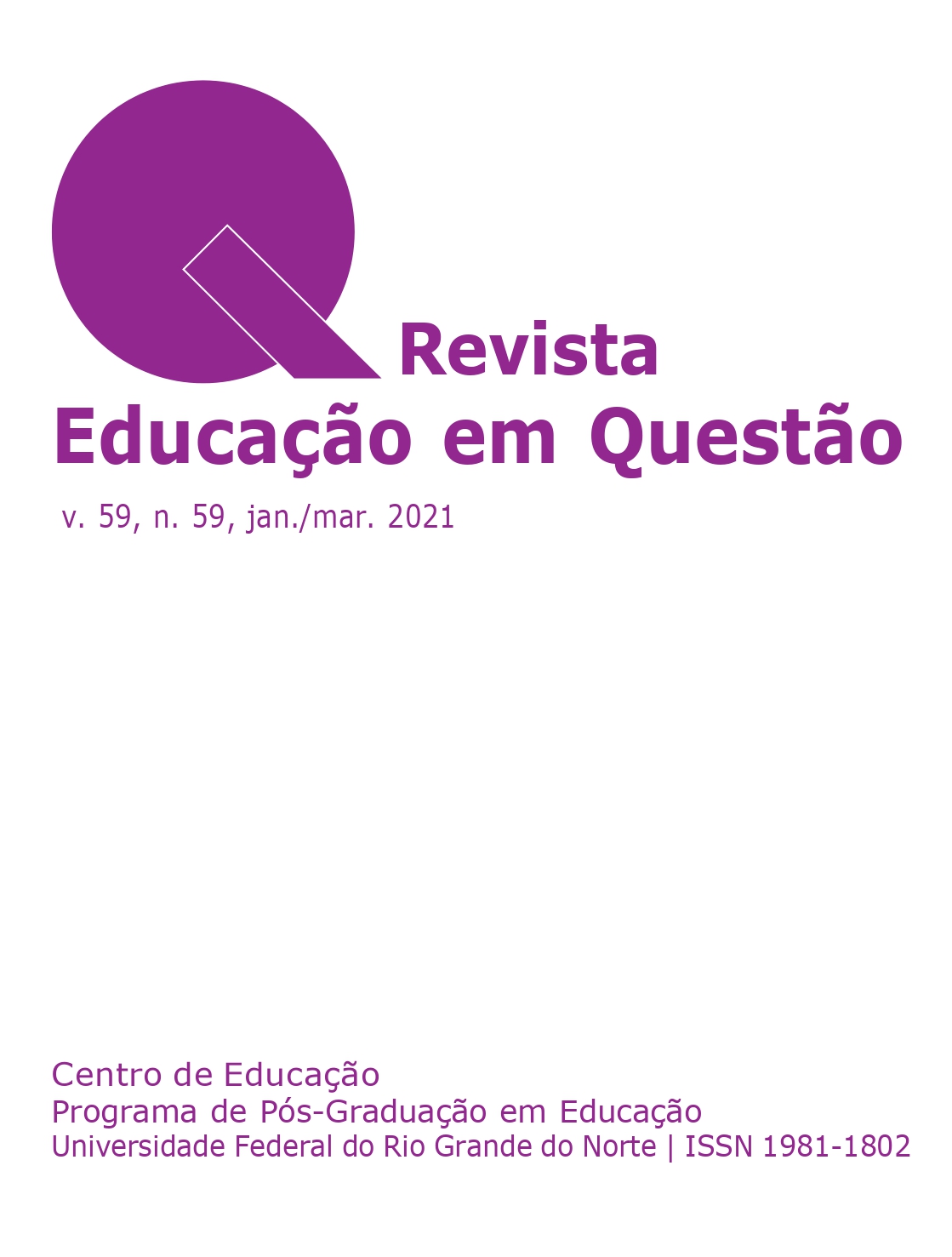At break
ethnographic notes on body training and gender constructs
DOI:
https://doi.org/10.21680/1981-1802.2021v59n59ID23046Keywords:
School. Body. Gender. Class break.Abstract
This article proposes a reflection on one of the school rites in which the (in) docile bodies of girls and boys, presumably, can express themselves with more freedom: break time. What is the break, that magical, noisy and bustling interval that for a moment breaks a continuum of prescriptions and proscriptions? From an ethnographic perspective, we realize that the break time is also made up of rules, not always explicit. Rules that separate, classify and rank, and contribute to the incessant work of training of bodies at school. The games and plays that take place during it are generified, as are the spaces in which they take place. From the court to the courtyard, the normalizing sanction falls in different ways on the bodies of girls and boys, according to the gender of the transgression and the transgressions of gender. However, despite constant vigilance, girls and boys resist, deviate, and create: they tension and displace gender boundaries in their games and plays, testing, in a playful way, other ways of being and staying in the world.
Downloads
References
ALTMANN. Helena. Marias (e) homens nas quadras: sobre a ocupação do espaço físico escolar. Educação & Realidade, v. 24, n. 2, p. 157-173, jul/dez, 1999. Disponível em https://seer.ufrgs.br/educacaoerealidade/article/view/55438/33701. Acesso em: 18 jul. 2020.
BOURDIEU, Pierre. A dominação masculina. Tradução Maria Helena Küner. Rio de Janeiro: Bertrand do Brasil, 2003.
BOURDIEU, Pierre. Nouvelles réflexions sur la domination masculine. Cahiers du Genre, v. 2, n. 33, p. 225-233, 2002. Disponível em: https://www.cairn.info/revue-cahiers-du-genre-2002-2-page-225.htm. Acesso em: 25 jan. 2020.
BOURDIEU, Pierre. O senso prático. Tradução Maria Ferreira. Petrópolis: Vozes, 2009
BOURDIEU, Pierre. A Casa Kabyle ou o Mundo às Avessas. Cadernos de Campo, v. 8, n. 8, p. 147-159, 1999. Disponível em http://www.revistas.usp.br/cadernosdecampo/article/view/52774/56619. Acesso em: 20 jan. 2020.
CARVALHO, Marília Pinto de. Quem são os meninos que fracassam na escola? Cadernos de Pesquisa. São Paulo, v. 34, n. 121, p. 11-40, jan/abr. 2004. Disponível em https://www.scielo.br/pdf/cp/v34n121/a02n121.pdf. Acesso em: 03 mai. 2020.
CARVALHO, Marília Pinto de. O conceito de gênero no dia a dia da sala de aula. Educação Pública. Cuiabá, v. 21, n. 46, p. 401-412, mai/ago, 2012. Disponível em https://periodicoscientificos.ufmt.br/ojs/index.php/educacaopublica/article/view/416/381. Acesso em: 20 jun. 2020.
CLARA. Entrevista. Petrópolis (Rio de Janeiro). 17 de maio. 2018.
CRUZ, Tânia Mara & CARVALHO, Marília. Jogos de gênero: o recreio numa escola de ensino fundamental. Cadernos Pagu, v. 26, p.113-143, jan/jun, 2006.
Disponível em https://www.scielo.br/pdf/cpa/n26/30388.pdf. Acesso em: 20 jun. 2020.
DAMATTA, Roberto. O ofício do etnólogo ou como ter anthropological blues. Boletim do Museu Nacional, v. 27, p. 01-12, 1978.
FOUCAULT, Michel. Vigiar e Punir: nascimento da prisão. Tradução Raquel Ramalhete. Petrópolis: Vozes, 2014.
FOUCAULT, Michel. História da sexualidade II. O uso dos prazeres. Tradução Maria Thereza da Costa Albuquerque. Rio de Janeiro: Edições Graal, 1988.
FOUCAULT, Michel. Microfísica do poder. Tradução Roberto Machado. Rio de Janeiro: Edições Graal, 1979.
GEERTZ, Clifford. A interpretação das culturas. Tradução Fanny Wrobel. Rio de Janeiro: LTC, 2015.
GERBER, Rose Mary. Mulheres e o mar: uma etnografia sobre pescadoras embarcadas na pesca artesanal no litoral de Santa Catarina, Brasil. 2013, 418f. Tese (Doutorado em Antropologia Social) – Programa de Pós-Graduação em Antropologia Social, Universidade Federal de Santa Catarina, 2013.
HÉRITIER, Françoise. Masculin/Féminin. La pensée de la différence. Paris: Éditions Odile Jacob, 1996.
LAQUEUR, Thomas. Inventando o sexo. Corpo e gênero dos gregos a Freud. Tradução Vera Whately. Rio de Janeiro: Relume Dumará, 2001.
LENA. Entrevista. Petrópolis (Rio de Janeiro). 18 de maio. 2018.
OLIVEIRA, Roberto Cardoso de. O trabalho do antropólogo. Rio de Janeiro: UNESP, 2000.
SCOTT, Joan. Gênero: uma categoria útil de análise histórica. Educação e Realidade, Porto Alegre, v. 20, n. 2, jul/dez, 1995. Disponível em https://seer.ufrgs.br/educacaoerealidade/article/view/71721/40667. Acesso em: 26 jun. 2020.
WENETZ, Ileana, STIGGER, Marco Paulo. A construção do gênero no espaço escolar. Movimento, Porto Alegre, v. 12, n. 01, p. 59-80, jan/abr, 2016. Disponível em https://seer.ufrgs.br/Movimento/article/view/2891/1527. Acesso em: 10 jul. 2020.
WENETZ, Ileana, STIGGER, Marco Paulo & MEYER, Dagmar Estermann. As (des)construções de gênero e sexualidade no recreio escolar. Revista Brasileira de Educação Física e Esporte, São Paulo, v. 27, n. 1, jan/mar, 2013. Disponível em https://www.scielo.br/pdf/rbefe/v27n1/v27n1a12.pdf. Acesso em: 18 jul. 2020.
WÜRDIG, Rogério Costa. Recreio: os sentidos do brincar do ponto de vista das crianças. InterMeio: revista do Programa de Pós-Graduação em Educação, Campo Grande, MS, v.16, n.32, p. 90-105, jul/dez, 2010. Disponível em https://periodicos.ufms.br/index.php/intm/article/view/2427. Acesso em: 20 jul. 2020.
Downloads
Published
How to Cite
Issue
Section
License
The Journal Education in Question shall retain the copyright in all articles that it publishes.
The authors and co-authors of articles and book reviews, published in the Journal Education in Question, shall wait for at least 1 (one) year before they are allowed to submit new works for publication.






